Do You Need Protein Powder Supplements? See the Guide
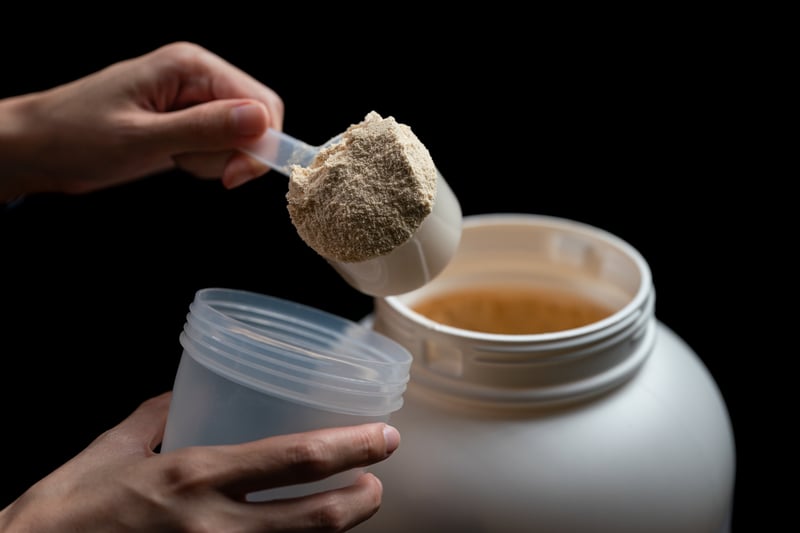
When it comes to eating right, a tremendous amount of emphasis is put on protein. Although the attention placed on protein may seem a bit overkill at times, the reasoning behind it is a no-brainer since proteins are essentially the building blocks of life.
You see, every cell in the human body contains protein. As a result, higher-protein diets are arguably one of the most effective nutritional tools to help people enjoy greater health. 1,2 However, when transitioning to a higher protein diet, do you need a protein supplement?
Let’s take a deeper look into the benefits of high-protein diets and whether or not a protein powder supplement may be a good fit for you.
What is a High-Protein Diet?
To begin, let’s first define what is considered a high protein intake. For the average healthy adult, the Dietary Reference Intake or RDI of protein is around 0.36 grams per pound of body weight. That is, approximately 56 grams per day for the average man and 46 grams per day for the average woman if they’re sedentary.
For active people (i.e., those who exercise regularly), a high-protein diet would be increased to 0.73 to 1 gram per pound of body weight. Although this is significantly more than the RDI suggestions, research has demonstrated one can safely consume up to two grams of protein per pound of bodyweight. 3
Science-Backed Benefits of Increased Protein
High-protein diets have been shown to improve health and metabolic function as well as help folks maintain a healthier body weight with less fat and more muscle. One of the most well-known benefits of consuming a diet high in protein is how it supports a stronger metabolism simply by its own thermogenic effect. 2,4 – 6 This means more energy is required to digest and break down protein. Therefore, you use more calories when consuming more protein. Further, if it takes more calories to break down your food, your body is less likely to store those calories as fat (i.e., excess body weight). 7
Not only can protein help increase metabolism, but it’s also good for brain health. Protein is essential for getting nutrients to the brain. You see, the brain constantly produces neurotransmitters, which allow the brain and body to communicate. 8 These neurotransmitters are made up of amino acids—the fundamental components of protein. Consuming a higher protein diet helps promote neurotransmitter production to optimize brain function. This, in turn, may help improve mental clarity and reduce brain fog. 8
Most importantly, consuming more protein can help reduce your risk for disease and illness. Following a high-protein diet has been linked to decreasing the risk for heart attacks and strokes because it can lower blood pressure, cholesterol, and triglycerides. 9,10 Additionally, since antibodies and interferons—part of the immune system—rely on protein to function, consuming adequate amounts of protein can lead to better immune function and potentially fewer colds. 11
Many of the benefits seen with high-protein diets could be attributed to the fact that consuming more protein increases satiety. 12 In other words, folks who eat more protein tend to feel more satisfied or full after meals, which can then reduce calorie intake as well as decrease cravings throughout the day. This could also be due to protein decreasing levels of the hormone ghrelin, also known as the “hunger hormone.” 13
Protein also increases the production of hormones that help you feel full for longer (e.g., leptin). 14 As a result of higher satiety and balancing your hormones, one will likely consume fewer calories from carbohydrates and fat, making protein an excellent option for managing weight and improving body composition.
What Happens When You Get Too Little Protein?
Aside from all the wonderful health benefits we can experience from consuming protein, it is also essential to make sure you are getting enough protein to avoid a protein deficiency. Although this condition is considered rare, it is vital to eliminate your risk as it may lead to adverse health effects.
You see, protein deficiency can lead to fatty liver, edema, bone fractures, and hypoproteinemia (an abnormally low level of protein in the blood). 1,3 Signs you may be under-consuming protein include brittle hair and nails, muscle loss, low energy or feeling weak, and a compromised immune system. 3
And as we get older, protein intake becomes even more critical as aging adults are at the highest risk for under-consuming protein. This is because older adults require more protein per pound than younger people do. 15 As we age, our body composition changes. Most noticeably, we tend to lose muscle mass. 16 This can contribute to increased skin fragility, decreased immune function, poor healing, longer recovery from illness, and even developing sarcopenia (the loss of muscle tissue as we age) or osteoporosis (when the bones become brittle and fragile). 16 – 18
What Happens When You Get Too Much Protein?
On the other hand, what happens if you consume too much protein? In the short term, consuming an excess poses little threat. This is because excess protein in the body can increase ammonia within the body, which can be easily cleared with a slight increase of water intake in a healthy adult.
However, if too much protein is consumed over a long period of time, conditions such as hypercalcemia can develop, which causes elevated levels of calcium in your urine. This higher-than-normal level of calcium can happen when your body starts to break down your bones and can lead to kidney stones.
Therefore, understanding and calculating how much protein is optimal for your body to reap all the benefits of higher protein diets is essential. If you’re having trouble figuring out your own personalized protein needs, your doctor or a registered dietitian can help guide you on the best choices for your body.
Should I Use a Protein Powder Supplement?
Once determining your ideal protein intake based on factors such as your age, weight, activity level, and health, you may be questioning the best way to incorporate more protein into your daily diet. With most dietary changes, the preparation can be just as much, if not more, work than maintaining the actual diet. Fortunately, high-protein diets don’t need to take a huge amount of effort.
As with any change, simple steps can be taken to reach your goals. Some easy ways to up your protein intake include:
- Starting your day with a high-quality protein
- Choosing protein-packed snacks like nuts and plain Greek yogurt
- Including high-protein foods, such as chicken, fish, legumes, quinoa, hemp or chia seeds, with every meal.
While in most cases it’s best to get most of your nutrition from whole foods, if you’re having trouble getting enough protein in your diet, a protein powder supplement could be beneficial.
Protein supplements can fit into any daily routine and make achieving your daily protein needs much easier and more convenient. Not only that, but protein supplements serve as a healthy alternative to other non-healthy on-the-go food and beverage options. So, if you decide that a protein powder supplement is right for your lifestyle and helping you achieve your goals, here are a few products to consider.
1. BioTrust Low Carb Protein
BioTRUST Low Carb protein powder supplement provides 24 grams of grass-fed protein from pasture-raised cows, only 150 calories, and 4 grams of net carbs. Even more, it has been carefully cold-processed to ensure the highest quality, undenatured, bioactive low-carb protein powder. It even features gut-friendly prebiotics and protein-digesting enzymes to support stomach-friendly digestion and protein absorption.
2. BioTrust Low Carb Lite
BioTRUST’s Low Carb Lite provides 20 grams of premium quality whey protein isolate with only 100 calories and 2 grams of carbs per serving. Additionally, BioTRUST Low Carb Lite provides 4.7 grams of branched-chain amino acids (BCAAs), including 2.2 grams of leucine, as well as immunoglobulins and lactoferrin, which provide nutritional support for healthy immune system function. BioTRUST Low Carb Lite is cold-processed using acid-free, membrane technology to create a highly pure, undenatured whey protein isolate.
3. Ageless Multi-Collagen
Collagen protein, in particular, has been linked to beneficial effects for your skin, hair, nail, gut, joint, and bone health. BioTRUST’s Ageless Multi-Collagen is loaded with 10 grams of collagen protein per serving, including the 5 key types of collagen as well as BioActive collagen peptides and is a complete protein source featuring 140 mg of Tryptophan. Ageless Multi-Collagen also mixes instantly without clumps in hot or cool liquids and is available in a tasteless, odorless flavor as well as chocolate or vanilla, making it an easy addition to any drink or recipe.



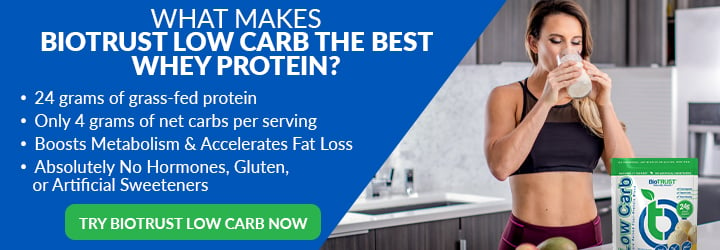

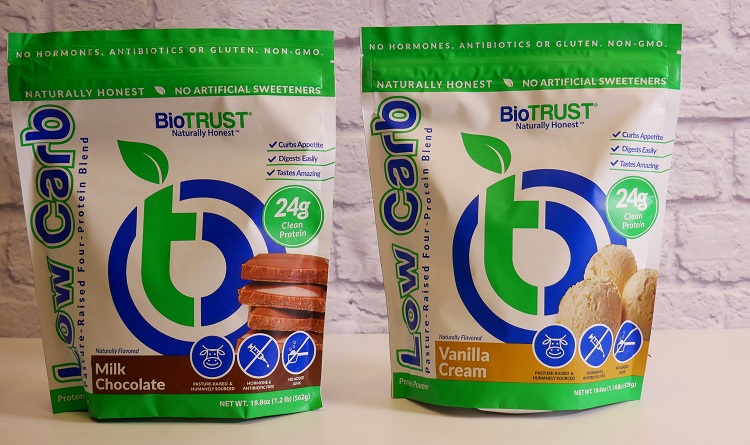
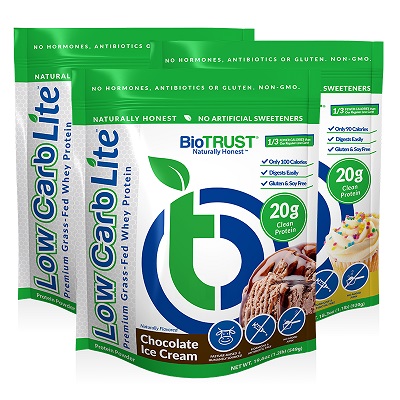
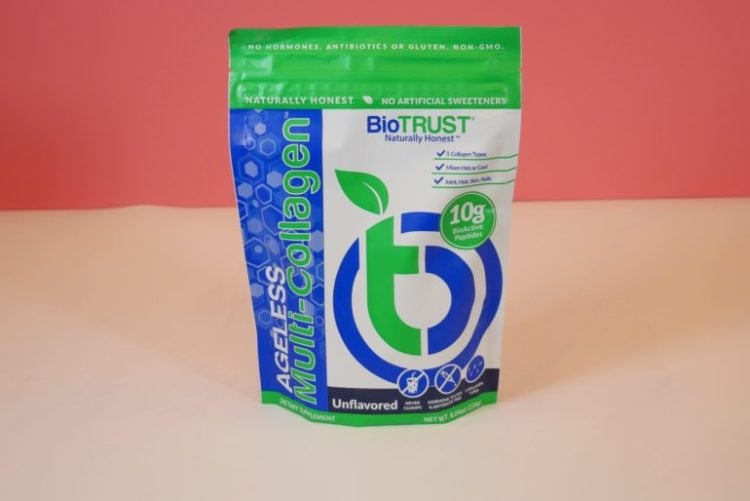
 7 Signs Your Body is Seriously Low on Collagen (not just wrinkles)
7 Signs Your Body is Seriously Low on Collagen (not just wrinkles) Health Expert: "Turmeric Doesn't Work (unless...)"
Health Expert: "Turmeric Doesn't Work (unless...)" 3 Warning Signs Your Probiotic Supplement is a Total Waste
3 Warning Signs Your Probiotic Supplement is a Total Waste

